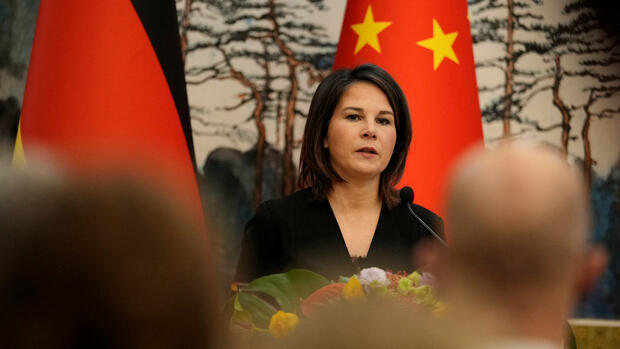Berlin The conservative wing of the SPD is clearly critical of the Greens’ strategy in dealing with China. “Currently, the heads of the Federal Foreign Office and the Federal Ministry of Economics are working their way from one individual case to the next. The focus there is more on the domestic symbolic power of the measures taken than on far-sighted politics, ”says a thesis paper by the Seeheimer Kreis with a view to the department heads Annalena Baerbock and Robert Habeck (both Greens).
The SPD wing claims to have 93 members of the Bundestag and thus almost half of the Bundestag faction. The members call for “a coordinated, uniform and long-term strategy within the federal government in dealing with China”.
An “open and honest exchange with China” is also important. “An abrupt end to trade relations with China would be an economic disaster,” the MPs warn. “In this respect, a coherent China strategy must not be an anti-China strategy that aims to decouple Germany from China.”
In this sense, from the point of view of the SPD politicians, foreign investments from China should also be “welcome and not placed under general suspicion”. Therefore, the same principles should apply to companies with Chinese investment structures in Germany as to companies without Chinese investment structures. On the other hand, “it must be ensured that neither know-how nor data are lost and can be used by the People’s Republic”. There are security concepts from the Federal Office for Information Security (BSI) for this.
The push by the SPD wing comes while Baerbock is making her inaugural visit to China. The Foreign Minister’s trip was already considered delicate. Since the excitement about the visit to Beijing by French President Emmanuel Macron, the Green politician’s flying visit has become particularly important. After a visit to Beijing, the French President spoke out in favor of an independent EU position in the conflict between China and the USA on Taiwan, drawing a lot of criticism.
The French President had caused criticism with statements during his visit to China.
(Photo: Reuters)
Macron had warned that Europe was at risk of being a vassal between the US and China, although one could be a third pole. In addition, the traffic light coalition is currently struggling to find a line when dealing with China, which should ultimately lead to the government’s new China strategy.
In Beijing, Baerbock criticized the fact that the scope for civil society engagement in China was shrinking and human rights were being curtailed. She also warned the government of a military conflict with Taiwan, which she described as a “horror scenario”.
Greens criticize China paper from the SPD
In their paper, the SPD MPs advocate an “honest, direct and pragmatic dialogue” with China with a view to human rights violations. They also advocate that the EU speak with one voice in the event of escalating conflicts and coordinate with the transatlantic partners. “We must keep an eye on the potential conflict in all its manifestations between China, Taiwan and the Indo-Pacific region and take a clear position,” the paper says.
Due to its economic and political power, the SPD politicians also describe China as an important player and partner in tackling global challenges such as climate change, the looming nuclear arms race and the numerous trouble spots around the world. At the same time, China has increasingly developed into a competitor and systemic rival.
With regard to the Russian war of aggression against Ukraine, it is said that supply chains must be diversified and new partnerships established. “There must be no one-dimensional German foreign and economic policy towards China,” the MPs warn. The Ukraine war made it clear that Germany and the EU had to pursue a “multidimensional trade policy”.
>> Read also: In China, Baerbock evokes the unity of Europe in relation to Beijing
In their strategy paper, the SPD politicians therefore call for a new European investment agenda and industrial offensive. This requires stronger incentives for the settlement of solar, wind turbine and hydrogen producers as well as for important key technologies such as semiconductors, chips or batteries.
Habeck had already made it clear that one-sided dependencies, for example with important raw materials, should be avoided, delivery routes should be broadened and new markets outside of China should be opened up.
Criticism of the SPD paper comes from the Greens parliamentary group. “Value-based foreign and economic policy is just as little a matter of course in Germany as the principle of not making oneself dependent on dictatorships or cuddling with them,” said parliamentary group leader Konstantin von Notz on Twitter. “We should learn from the Nord Stream disaster, not repeat the same thing with China.”
Bavaria’s Prime Minister Markus Söder, on the other hand, accused Baerbock of pursuing a “very moral-based foreign policy”. “We cannot educate the whole world. It’s good to stand up for human rights, for democracy, for women’s rights, but in the end you have to see German interests a bit,” said the CSU boss RTL / ntv.
The Union itself has drawn up a China paper that the parliamentary group intends to adopt next week. The CDU and CSU want to herald a “change in China policy” and offer the federal government a “national consensus”.
More: Seven stocks from the Dax and MDax that are benefiting from the China boom
